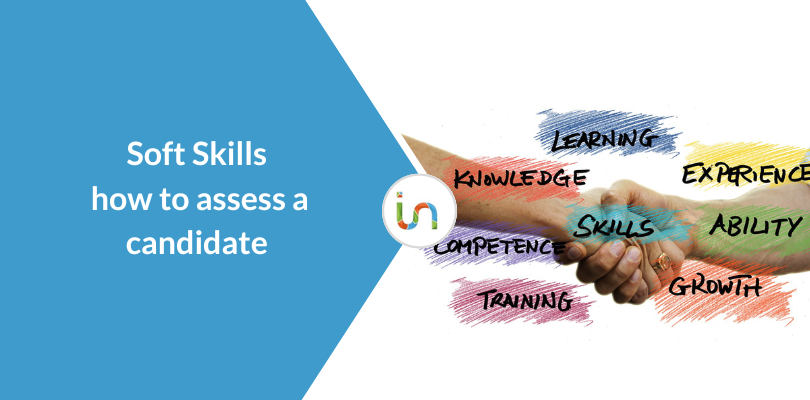
Soft Skills: how to assess a candidate on the basis of soft skills
In the world of work, there is increasing talk of soft skills. Where the adjective “soft”, could give be misunderstood: in reality, these are skills that are anything but negligible, especially in 2020, and will also be so in 2021. The year in which we may see an economic recovery and in which many companies will find themselves planning for a future with very different tools than those of 2019 and early 2020.
On the other hand, the health emergency caused by Covid-19 has highlighted the importance of new skills, as the first lockdown came totally unexpected, leading to a hybrid way of working.
Problem solving, communication skills, knowing how to work in a team and being able to work remotely, knowing how to adapt to situations and taking the positive side of it, i.e. resilience, are just some of the soft skills that emerged during this period.
But before we get into that, we need to define them in order to really understand what, in the field of competences, is the difference between soft skills and hard skills.
What are soft skills or transversal competences

The word ‘transversal’ already tells us a lot, it means that these skills are not linked to a single sector, but in fact can be common to people working in different fields (e.g. someone who deals with communication or works in a pharmaceutical company).
Soft skills are the resources of workers that have to do with character, personality and also experience, but not in the sense of “accumulation” of years spent in one company or another, but more as the possibility to improve some innate skills or to train them if they were dormant.
Soft skills are therefore intangible, i.e. it is difficult to measure, touch or evaluate them with numerical parameters. At the same time, they are the skills that make one technical job different from another.
For example, if one of our employees has 10 years of experience in digital customer care and knows all the programmes provided by the company, and another has more or less the same years and the same knowledge, the difference between them could be in their resistance to stress. Or whether or not they have leadership skills. Obviously, then, faced with the same level of technical skills (which are always important), the soft skills that one of them has and not the other emerge.
Therefore, soft skills are that set of abilities having to do with thinking and cognitive processes, but also with behaviour in the work context as well as in the social context. They also concern the ability to reflect, to learn and to work in a certain way. We can say that they can concern: the personal sphere, the communicative sphere, the cognitive sphere and the organisational sphere.
These skills are not only used in the working world, but also in everyday life. For example, if I have the ability to work well in a group, which is a soft skill, it will not only be confined to work, but will also be evident when I am with my friends.
The difference between soft skills and hard skills
It goes without saying that these kinds of competences count for a lot in a candidate. This does not mean that hard skills, i.e. the technical skills needed to do the job, are neglected.
Knowing foreign languages, being able to use a computer, knowing how to use certain software, knowing how to design and run a training course, knowing how to write a text with SEO in mind, knowing how to prepare a presentation, and so on, are all skills that count and that have to do with qualifications, continuous training and, of course, experience. Soft skills give that little bit extra and ensure that a technical job is complemented by, for example, the ability to listen or a positive attitude that makes the job better.
9 soft skills a candidate must have
If hard skills and soft skills have clear boundaries, what are the most common and in-demand soft skills in human resources in 2020, but especially in 2021? Let’s review 9 of them.
1.Communication skills: writing and listening skills
These are important skills that are transversal to all jobs and to which every HR should aspire. This is because even if you work in the IT field, where it would seem that writing skills are not required as a technical competence, being able to write is an integral part of being able to communicate.
When working in smart working mode, it became clear how important it is to be able to write summary e-mails, explain a process and so on. What is related to communication also concerns knowing how to express oneself clearly, how to “negotiate” and consequently how to listen.
2.Leadership skills
This is a soft skill that many employers are looking for at all levels. Of course there are different types of leadership, but here it is understood as the ability to lead a team, but also to make a strong contribution to projects. Just as a leader is also someone who can motivate others and ensure that all activities are carried out in a timely manner. Reliability, the ability to meet colleagues’ needs and to guide them through difficult times are skills that HR should focus on.
3.Knowing how to work in a team
There is a lot of talk about working in a team and the need to do so, but this aspect is far from obvious and collaborating is not always so easy. That is why this soft skill is crucial and is independent of job title or sector. Linked to it are collaboration, honesty, transparency, communication skills and responsibility.
4.Learning ability and adaptability
Not everyone is predisposed to learn new concepts and make them their own, as well as to adapt them to the context in which they work. Knowing how to adjust, how to recognise that the road taken was not the right one and consequently how to learn new ways of doing things is a great soft skill. Linked to this is the concept of collaboration, but also of sharing what has been learned.
5.Knowing how to manage yourself

Managing oneself and one’s time is another important skill, even more so for smart workers. It is up to the employee to manage his or her time and to prioritise the right tasks, without getting stressed and doing them as effectively as possible. This skill, for example, has a lot to do with self-motivation but also with time management.
6.Organisational skills
Closely related to the above are organisational skills which, on the one hand, have to do with knowing how to manage oneself and, on the other hand, also with organising the work of others. As well as having to interface with a client. Paying attention to detail, being able to plan everything in the best possible way and being able to foresee the unexpected is essential. Critical thinking, attention to detail and conflict management are linked to these skills.
7.Problem solving
The ability to solve complex problems is not for everyone, let’s admit it, but if you are the HR of a large organisation it is a skill that you absolutely must test because you are more likely to be confronted with complex situations. So a soft skill that involves being able to deal with problems and solve them in the most appropriate way is essential. So is a positive approach to the problem, i.e. thinking that there is always a solution.
8.Analytical capacity
Linked to the above, analytical skills can be twofold. On the one hand, it is the ability to identify a problem and to analyse it into sub-problems in order to understand the cause-effect relationship. On the other hand, the ability to analyse is linked to the situation, to knowing how to read numbers, to knowing how to analyse what is happening. Using logic.
9.Openness of mind
Last but not least is the open-mindedness that not everyone has and that ensures that a person is always in tune with what is happening in the world around them. It is a soft skill that goes beyond the ability to learn: being open-minded means being open-minded about anything or anyone, including other colleagues, new situations and so on. A skill that should not be overlooked.
How to best assess candidates’ soft skills
As a recruiter you should test these soft skills from the very first interview, even if you can already guess something from the covering letter and the way a CV is written.
How? Already from the way your CV or covering letter is organised, you can certainly learn more about the candidate’s communication and organisational skills.
ATS software such as In-recruiting, which you can try free for 14 days, can help you on several levels. The software simplifies the pre-screening phase by checking the compatibility between the job position and the candidate’s skills with an automatic matching tool. This allows the recruiter to go deeper into the knowledge of the most suitable candidates and, for example, understand how the person communicates on social media. Yes, social recruiting is always involved. The software also helps you to organise interview notes and have personalised sheets for each role, and to tag candidates so that they can be easily found in future searches.
Let’s see more about what you can do at the interview.

Assesses the capacity for initiative
Ask the candidate whether he/she has ever independently identified a problem at work and what steps he/she has taken to correct it, primarily on his/her own.
Assesses the ability to learn from one’s mistakes
How and what did he/she learn from his/her mistakes? To find out, give him a hypothetical problem to solve and see how he behaves, how he thinks and what he uses to solve it. Without, of course, getting too technical.
Use behavioural interview questions
Behavioural interview questions are those that are based on real life experiences. Therefore, ask about experiences at work: a colleague who hindered his growth, a boss who put him under pressure, family problems that affected him at work. Or how he dealt with a particularly difficult customer or an inconclusive supplier.
But also positive things like successes or the best leader they have met, an unexpected promotion and so on.
Ask candidates to list and rank their soft skills
Finally, a good method can be to ask the applicant directly to list which soft skills he/she has and which might be suitable for the job he/she is applying for. And after he/she has done that, you could ask him/her to rank them from the bottom to the top. In this way you will also see some of her organisational skills.
Why value soft skills in recruiting
There are several reasons to value soft skills in recruitment. One of them is that, no matter how technically good a person may be at his or her job, if he or she cannot get along with his or her colleagues, for example, he or she may compromise the team and the atmosphere in the company. Therefore, knowing this in advance helps to understand how to enhance his or her strengths in a way that is compatible with fitting into the company culture.
Assessing soft skills facilitates two things above all else: the success of the company and employee retention, i.e. preventing a person from leaving the company they work for. Obviously, this is closely linked to the Talent Acquisition process.
Any job position requires specific skills from the candidates, which means that a candidate cannot be considered suitable a priori. Recruiters must therefore pay close attention to all the skills that a person can bring to the company and try to make the most of them in relation to the company culture, values and value proposition.

Giornalista, content strategist e formatrice
Siciliana trapiantata a Milano, città che ama molto come la sua terra. Giornalista, SEO copywriter, formatrice e amante del live tweeting, scrive per varie testate e blog aziendali di lavoro, risorse umane e tanto altro.
Ha scritto nel 2020 il suo primo libro “Scrivere per informare” insieme a Riccardo Esposito, edito da Flacowski e nel 2021 altri due: “L’impresa come media” e “Content marketing per eventi“.
Ama il mare, la bici, la pizza, i libri, le chiacchiere all’aperto.